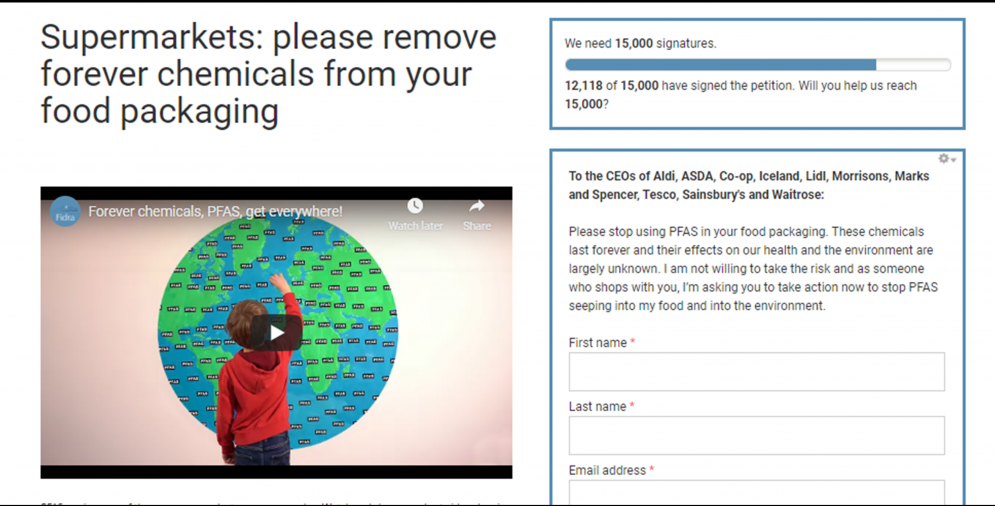Almost 12,000 people sign petition urging supermarkets to remove chemicals of concern, PFAS, from UK food packaging, amidst growing concerns linking exposure to reduced immunity, and to long-term environmental harm.
Today we delivered 11,860 signatures to the CEO’s of Aldi, ASDA, Co-op, Iceland, Lidl, Morrisons, Marks and Spencer, Tesco, Sainsbury’s and Waitrose, urging them to remove PFAS, a group of harmful pollutants, from UK food packaging. Public concern around PFAS has been growing in recent months following mounting scientific evidence linking exposure to immune system suppression(1), reduced vaccine efficacy(1), and an increased risk of developing severe COVID-19 symptoms(2).
PFAS have many different uses, including providing water and grease repellency to paper, board and compostable food packaging. With the food sector heavily focused on moving away from single-use plastic, the market share of these alternative forms of packaging is likely to increase dramatically. Fidra, supported by almost 12,000 concerned members of the public, are asking UK supermarkets to protect our health and the environment by going beyond minimal legal requirements, and by taking immediate, voluntary action to remove PFAS from food packaging.
The petition is backed by DARK WATERS actor and environmental activist Mark Ruffalo, and environmental attorney Rob Bilott, who’s life is depicted in the movie, and who continues to fight for justice for communities exposed to dangerous levels of PFAS pollution.

The problem with PFAS
PFAS (Per and Poly-fluoroalkyl Substances) are a group of highly persistent industrial chemicals, associated with a wide range of health and environmental issues, from cancer in humans(3-6) to neurological problems in animals(7). PFAS are known as the ‘forever chemicals’ because some are known to take over 1,000 years to breakdown(8). As such, almost all the PFAS ever produced are still in our environment today, and concentrations are growing. PFAS are in air(9), oceans(10), soil(11) and wildlife(12), all across the globe. They are building to dangerous levels in European drinking waters, can be taken up by crops, and are contaminating our food chains(1). 99% of people tested have been found to have PFAS in their blood(13), with intake levels for infants and young children approximately double that of adults(1). Babies are now born with PFAS already in their bodies(1). Previous research conducted by Fidra, revealed widespread PFAS use in food packaging across the UK(14).
The solution to PFAS
Once in the environment, no effective method of wide-scale remediation exists. To prevent pollution, PFAS production must be stopped at source. The EU have already committed to ban all PFAS across all sectors, unless their use is considered essential to society(15). Denmark implemented a ban on PFAS in food packaging in July 2020. Global food companies such as McDonalds(16) and Nestle are working towards targets to remove all PFAS from their food packaging. Alternatives to PFAS already exist. However, in the UK we continue to produce, use and dispose of PFAS-treated food packaging, adding more of these chemicals to our environment and increasing our exposure. Ultimately, UK legislation is needed to prevent this ongoing source of harmful pollution across all non-essential uses However, supermarkets can take immediate action that will prevent the continued use of PFAS in food packaging, cutting this important and potentially growing source of environmental pollution.
Fidra’s PFAS lead, Dr Kerry Dinsmore says:
“Many UK supermarkets are already committed to reducing their single-use plastic, something we fully support at Fidra. However, supermarkets must ensure they don’t undermine the environmental benefits of their current sustainability drive by simply replacing one visible pollutant with a hidden, and more toxic, chemical alternative. PFAS must have no place in the future of the UK’s sustainable food packaging.”
“As we wait for comprehensive UK legislation on forever chemicals, we’re asking UK supermarkets to take immediate action within their own supply chains, removing PFAS from food packaging and cutting this important source of environmental pollution. Alternatives already exist, and with takeaway chains and global brands committing to end their use of PFAS, there is no reason why UK supermarkets can’t do the same‘.’
In an open letter to UK ministers, award-winning actor and activist Mark Ruffalo said:
‘’For decades, industrial chemical companies have gotten away with knowingly polluting the environment and risking human health for economic gain. This has gone on far too long. To protect ourselves, our children and our environment, governments need to act now to end the unnecessary use of PFAS.”
In an open letter to UK ministers, Lawyer and author Rob Bilott said:
“As the chemical industry’s move from PFOA to new PFAS-variant “GenX” has shown, it is not enough to restrict individual PFAS on a one-by-one basis. All share a similar chemical structure, therefore all should be reasonably considered as chemicals of concern.”
References
- EFSA Panel on Contaminants in the Food Chain et al., Risk to human health related to the presence of perfluoroalkyl substances in food. EFSA Journal 18, e06223 (2020).
- P. Grandjeanet al., Severity of COVID-19 at elevated exposure to perfluorinated alkylates.PLOS ONE 15, e0244815 (2021).
- G. Liuet al., Perfluoroalkyl substances and changes in body weight and resting metabolic rate in response to weight-loss diets: A prospective study.PLOS Medicine 15, e1002502 (2018).
- D. Melzer, N. Rice, M. H. Depledge, W. E. Henley, T. S. Galloway, Association between Serum Perfluorooctanoic Acid (PFOA) and Thyroid Disease in the U.S. National Health and Nutrition Examination Survey.Environmental Health Perspectives118, 686-692 (2010).
- S. Saikat, I. Kreis, B. Davies, S. Bridgman, R. Kamanyire, The impact of PFOS on health in the general population: a review.Environmental Science: Processes & Impacts15, 329-335 (2013).
- F. Chunyuanet al., Perfluorinated Chemicals and Fetal Growth: A Study within the Danish National Birth Cohort.Environmental Health Perspectives 115, 1677-1682 (2007).
- K. Eggers Pedersenet al., Brain region-specific perfluoroalkylated sulfonate (PFSA) and carboxylic acid (PFCA) accumulation and neurochemical biomarker Responses in east Greenland polar Bears (Ursus maritimus).Environmental Research 138, 22-31 (2015).
- CHEM Trust, “PFAS the ‘Forever Chemicals’; Invisible threats from persistent chemicals,” (2019).
- J. L. Barberet al., Analysis of per- and polyfluorinated alkyl substances in air samples from Northwest Europe.J Environ Monit 9, 530-541 (2007).
- N. Yamashitaet al., A global survey of perfluorinated acids in oceans.Marine Pollution Bulletin 51, 658-668 (2005).
- Z. Liuet al., Multiple crop bioaccumulation and human exposure of perfluoroalkyl substances around a mega fluorochemical industrial park, China: Implication for planting optimization and food safety.Environment International 127, 671-684 (2019).
- Magali Houde, Jonathan W. Martin, Robert J. Letcher, Keith R. Solomon, Derek C. G. Muir, Biological Monitoring of Polyfluoroalkyl Substances: A Review. (2006).
- A. M. Calafat, L.-Y. Wong, Z. Kuklenyik, J. A. Reidy, L. L. Needham, Polyfluoroalkyl Chemicals in the U.S. Population: Data from the National Health and Nutrition Examination Survey (NHANES) 2003–2004 and Comparisons with NHANES 1999–2000.Environmental Health Perspectives115, 1596-1602 (2007).
- K. J. Dinsmore, “Forever chemicals in the food aisle: PFAS content of UK supermarket and takeaway food packaging,” (Fidra, 2020).
- E. Commission, “Chemicals Strategy for Sustainability; Towards a Toxic-Free Environment,” (2020).
- Safer Chemicals Healthy Families. (2021).

